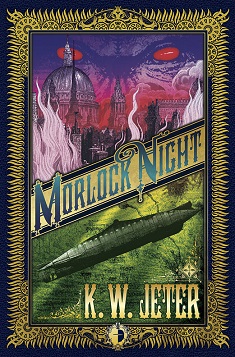
Morlock Night
K. W. Jeter
301 pages
published in 1979
The inside cover calls this “one of the three foundational steampunk texts”, but it’s a steampunk that’s far removed from what modern writers mean by it. Morlock Night is far more anarchic, not so stiffly Victorian Brass ‘N Goggles as its descendants. Originally written as throwaway fiction for a British pulp line which wanted a series of novels about king Arthur reincarnated when England needs him most. Jeter and two of his friends divided the series up between them and Jeter went for a 19th century setting. Why they got American novelists to write them is anybody’s guess, but the end result is a seriously gonzo science fiction novel.
It starts off as a sequel to H. G. Wells The Time Machine, asking a simple question: what happened after the Time Traveller went back to the time of the Eloi and Morlocks after he had told his story? One Edwin Hocker –and what a moniker for any author to saddle his protagonist with –, one of the guests at the evening Wells immortalised is about to find out as he’s accosted by a strange man on his way home who drags him, very much against his will, into an adventure even stranger than that of the original Time Traveller, as he’s needed to save England from a Morlock invasion.
So far, so predictable. But things take a turn for the stranger quickly. That pale man that recruited Hocker is none other than Merlin, behind the Morlock menace is his old enemy, while king Arthur has been reincarnated but is in no position to do anything about it. What’s at stake is no less than the very existence of the universe and worse, Christendom and England.
Of course Hocker, Merlin and Arthur do succeed is stopping this menace, but not before e.g. having to traverse the London sewers and ending up in an deep underground community, in the same place where all the treasures lost in London end up, an outpost of ancient Atlantis.
So yeah, Jeter throws a lot of ideas in the air, some of which were less played out in 1979 than they would be now and just lets the plot rollick around with enough momentum that you don’t go “hang on, what just happened” until after you put the book down. It’s a terrific and fun read, something I zipped through in an afternoon. However, it did make me slightly uncomfortable in its politics.
It’s done tongue in cheek, yes, but Jeter does have his heroes share the xenophobic little Englander views of the world of your average self satisfied Victorian Englishman, with the Morlocks described in distinctively racial terms as subhuman brutes with no redeeming feature to them. Granted, this was also present in the original Wells novel, considering that the whole Morlock/Eloi section of that book was basically the educated middle class Victorian social democrat man’s nightmare about the coming rule of the proletariat, but Jeter went further because he makes it more explicit. And of course he was writing roughly a century later and might have known better.
Where this a serious book rather than a romp this racism would make this into a wallbanger — as I’d throw it against the wall. But because this is a tongue in cheek adventure romp it can be overlooked, though I do think you should always point these things out. It’s after all in the unconscious or conscious use of these sort of racist tropes that they get perpetuated.
But we shouldn’t take this too seriously, cause Jeter certainly didn’t. Treat it as the gonzo adventure it is, don’t think too hard about the consequences of its politics and see this as the historical novel this is, one of the starting points of steampunk, even if it perhaps was a dead end.
No Comments